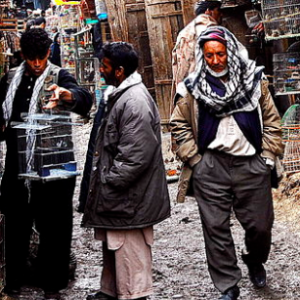In September 2011, I sat in my shipping container as the “duck and cover” sirens rang over the loudspeakers at the U.S. Embassy in Kabul.
The head of the Afghanistan High Peace Council, Burhanuddin Rabbani, had just been assassinated in his home in the Wazir Akbar Khan neighborhood of Kabul, right next to the Embassy. We had experienced the first attack on the U.S. Embassy just one week prior, and as the sirens went off again, all I could do was cry. Not as an American who was experiencing another traumatic event and couldn’t wait to go home, but as an Afghan-American who was grieving for the Afghanistan of my mother’s generation. An Afghanistan that may have been poor by international standards but was rich in so many other ways.
I don’t claim to speak for all Afghan-Americans, or all Afghan-American women — as with any group, we are not monolithic. I speak only for myself: born in mid-1980s Kabul to a middle-class family, forced to flee during the Soviet war, raised in Germany and the United States, and driven by a passion for international affairs and a sense of obligation toward both my motherland and my adopted home. I’ve worked on Afghanistan-related issues since 2011, in three different positions and at times as a “frontline civilian.”
What’s missed in the news these days is that when we talk about Afghanistan, we’re talking about people — people with aspirations of health, happiness and success for their children; people who desperately want to go to work without fear of violent conflict during their morning commute; people who are working to build an Afghanistan that is worthy of generations to come, men and women included.
For every story of failure, there is a story of success, no matter how minor it may seem. For every story of corruption or greed, there is a story of generosity and humanity. For every story of despair, there is a story of hope.
Stories like that of the young Afghan employees — men and women — at the U.S. Embassy in Kabul, many of whom are the breadwinners for their immediate and extended families, and who are old enough to remember the horrors of the Taliban era. Stories like those of the courageous Afghan civil servants at government ministries, some of whom are old enough to “retire” but who want so much to contribute and share their knowledge with the younger generation. Stories like those of countless Afghan civil society activists who are holding their government accountable; of journalists and broadcasters asking hard-hitting questions of those in power to ensure that the foundation of today’s Afghanistan has human rights and democracy at its core.
After 18 years, Afghans are not passive subjects of the international community’s whims — least of all Afghan women. They are agents of change. But like other agents of change, Afghans need support. I am not advocating for a perpetual U.S. military presence — I am advocating for compassion, moral responsibility, and an understanding of our common humanity with a people who have endured four decades of war through circumstances not entirely of their own making.
My mother’s Afghanistan may never come back, and there are enormous challenges that lie ahead. Neither Afghans nor Americans are naive about the work that remains to be done, or about the rocky and difficult path ahead. But let’s not forget that Afghans have been rebuilding for less than half the amount of time that they have experienced war. As with so many other facets of life, it is easier to tear something down than to build it back up. We must recognize just how far Afghanistan has come in a relatively short period of time.
I wish for the brightest future one can possibly imagine for Afghanistan and its people. A future as bright as the snow-capped mountains of the Hindu Kush, and as sweet as the melons and pomegranates Afghanistan is famous for. And I wish for understanding and empathy from my fellow Americans — the Afghan people recognize and are grateful for your generosity and sacrifice. They simply dream of a day when the sacrifices on both sides are no longer unnecessary, and they are working diligently to make that dream a reality.

